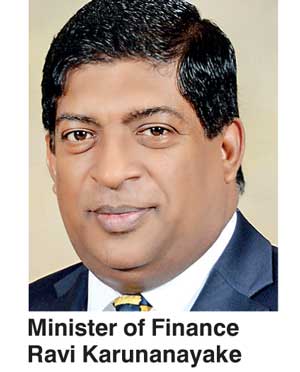Sunday Feb 22, 2026
Sunday Feb 22, 2026
Monday, 31 October 2016 00:00 - - {{hitsCtrl.values.hits}}
 The forthcoming budget to be presented on 10 November will be a people’s budget as it would incorporate ideas proposed by citizens from all corners of the country. The Ministry of Finance has already received over 2200 proposals from the people. This also includes proposals from other sectors of the economy, trade unions; trade chambers corporate sectors, companies and individual firms.
The forthcoming budget to be presented on 10 November will be a people’s budget as it would incorporate ideas proposed by citizens from all corners of the country. The Ministry of Finance has already received over 2200 proposals from the people. This also includes proposals from other sectors of the economy, trade unions; trade chambers corporate sectors, companies and individual firms.
The Minister of Finance Ravi Karunanayake said that he had already visited several provinces to get first hand information from people of their expectations and what they need to improve their livelihood. The Minister visited places such as Mavil Aru in Trincomalee, Polonnaruwa, Galle and several other districts. Further, the Minister also had discussions with trade union representatives and others who represent various sectors of the economy such as tourism, poultry industry, vehicle importers, trade and industry in Colombo and the provinces.
For the first time in the history of budget making, the Finance Ministry has obtained the services of academics to conduct systematic survey on the needs of the people.
Accordingly, teams of academics from ten national universities recently handed over their findings from Divisional Secretariat level surveys conducted island-wide. These academics teams, with the assistance of the Ministry of Finance, conducted systematic surveys on the economic needs of the people covering 332 DS divisions in the country with the Aegis of respective Divisional Secretaries.
“The budget, with the incorporation of proposals from the people and the Government policy of transforming the country into a manufacturing economy, will have many surprises beneficial to all and the concessions given by way of price reduction of essential goods and services will continue unabated,” declared the Finance Minister on his budget secrets.
Finance Minister said that all these proposals were being studied before finalising the budget as the Government has adopted a bottom-up approach in making the budget a reality. All these years, previous Governments have been in the habit of adopting top-down approaches for budget-making.
This approach made budget-making and maintaining by Government ministries easy as financial allocations line ministries were made on an incremental basis, taking into consideration the previous allocation, irrespective of whether the projects implemented were beneficial to the people or brought any return on investment.
Karunanayake said that the Government has decided to discontinue the system of incremental budget allocation from this year and instead all ministries have been allocated funds on Zero based budget proposals put forward by the ministries in accordance with the Government’s national economic priority plans. Accordingly, all ministries have to submit their annual action plans before finalising the allocations and they would be required to strictly adhere to and monitor implementation of the plan.
The minister said that as Sri Lanka aspires to become a higher middle-income country, it would need to adjust its development model with the intention of having increased per capita income and lowering the fiscal deficit to 3.5% of the GDP by year 2020.
Accordingly, the minister said that instead of hanging on mere slogans, through the forthcoming budget the Government will make available financial allocations to all line ministries based on their action plans in order to achieve the Government’s policy of generating one million job opportunities, enhancing income levels, developing rural economies, ensuring land ownership to rural and estate sectors, the middle class and government employees; and creating a strong middle class without any restrictions.